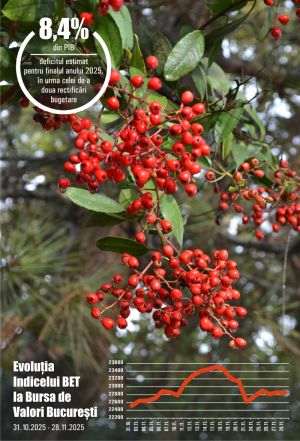The National Agency for Fiscal Administration and the General Directorate for Anti-Tax Fraud will have zero tolerance for tax evasion this year, said Marcel Boloş, the Minister of Finance, yesterday, during a press conference in which they presented how the generalization will work Ro e-Transport system.
Marcel Boloş stated: "According to the studies of the European Union, we are in a leading place, unfortunately, in the VAT GAP. It is about 9 billion euros, of which 40% is represented by the appropriate non-taxation of intra-community purchases. That is why it is a priority for us that these digitalization modules and projects that we are implementing are operationalized because the year 2024 is the year with zero tolerance for tax evasion, with zero tolerance for the waste of money from public funds and with zero increases of taxes and fees. (...) We have bad news for those who thought that our Ro e-Invoice system would fail: from the beginning of the year until now, 2,775,421 million invoices with a total value of 16 billions of lei, the maximum being reached last Friday when 675,000 invoices were entered into the system. We expect to grow to one million invoices per day entered into the system. I remind you that at the moment we operate in parallel with the two systems, namely reporting in our electronic invoice module and the classic option of issuing the invoice and then reporting it. Reporting is done within five days of issuing the invoice. If the system is interrupted after the electronic invoice part is resumed, the deadline remains the same, five days for reporting. Until July 1st, we have this optional regime that I reminded you of, and not reporting it in our electronic system, in the e-Invoice module, is a contravention. For micro-enterprises, we have a contravention sanctioned with a fine between 1,000 and 2,500 lei, for medium-sized enterprises the fine is between 2,500 and 5,000 lei, and for large enterprises, the fine is between 5,000 and 10,000 lei".
The Minister of Finance also briefly presented the balance sheet of the checks carried out by ANAF and DGAF, showing that the year 2023 ended with a total number of 87,000 tax and anti-fraud inspections with a total value of additional findings of 11 billion lei.
Marcel Boloş declared: "From the point of view of the number of tax inspections carried out last year, there were 20,813, with an additional value of revenues of 2.6 billion lei. In December alone, 1,789 tax inspections were carried out with a value of additional findings of 500 million lei. The most important finding from December is in the manufacturing industry, of 160 million lei, in the field of Value Added Tax. Also, also in the tax inspection area, documentary checks were carried out, basically a form of tax inspection that does not consist of going to the taxpayer's headquarters. There were 20,059 such documentary checks, with an additional revenue value of one billion lei. In December, there were 908 documentary checks and additional findings of 57 million lei. We still have the compliance notes, the so-called warnings for taxpayers. During the past year, we had 12,600 such referrals worth a billion lei. The General Antifraud Fiscal Directorate had 33,826 inspections and the value of the findings was almost 6 billion lei. In 2024, the objective in the fiscal and anti-fraud area is for the average amount of monthly receipts to reach 40 billion lei".
Regarding the generalization from January 1, 2024 of the Ro e-Transport system, the Minister of Public Finance showed that the system worked last year, when 19 million declarations were registered, and this year's extension concerns all goods that must be declared in customs points, the declarations to be taken into the online system, after which it follows the course of monitoring risky transports, the system operating on a traffic light model: red - with high risk, yellow with risk, under verification, and green - without fiscal risk . Tolls that will be marked in red on the electronic map by the monitoring system will be mandatorily stopped in traffic by the anti-tax fraud teams and will be checked.
Minister Marcel Boloş mentioned: "From the beginning of 2024 until now, on the mandatory declaration of e-Transport at border crossing points for intra-community purchases, we have received 152,000 declarations. The system operates without a contravention fine until July 1, 2024, but the declaration is mandatory. We try to use our means of advertising, including at the border crossing points to distribute leaflets to transporters to make known the respective obligations. After the generalization of this system, we will monitor through another system, which will be operationalized during this year - Ro e-Seal -, the traceability of these goods. The respective system will track the transports from the moment of declaration until the moment of capitalization through sale-purchase of these goods".
According to the data provided during the press conference by Teodor Georgescu, general director of DGAF, of the 19 million UIT codes generated in 2023 by the 10,000 companies in our country that carried out freight transport, 96.5% represented transactions carried out on the national territory.
The head of the DGAF specified that the high fiscal risk does not emerge from the declarations submitted last year, but he showed that many problems were at the border, where carriers declared one route and in reality carried out another, or declared that the respective goods were in transit, but in fact they later remained on the territory of Romania.
Teodor Georgescu said: "That's why, in order to carefully monitor these situations and combat them, the Ro e-Seal system will be introduced, so that the respective transports are no longer diverted. All the modules we will use - e-Invoice, e-Transport, e-TVA and e-Seal - will provide us with a complete database to know exactly the transaction of intra-community transports and goods with a high fiscal risk on the territory of Romania , and after we have this data we will capitalize on it through automatic risk analysis".
Minister Marcel Boloş concluded by saying that the project on the scanners at the border crossing points will soon be operationalized, which will also contribute to the collection of data necessary for the interoperability of the four systems that will configure the fiscal control in our country.




























































